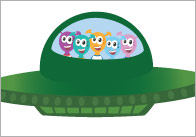Promoting emotional intelligence in early childhood
I noted in my last post that a child’s ability to engage in socio dramatic play has a dramatic effect on his emotional, social and intellectual growth. I thought I’d elaborate on this by talking a bit about emotional intelligence (a concept I touched on briefly in my discussion of Ferre Laevers’ wellbeing and involvement scales).
It’s a commonly held belief that there is a strong correlation between a child’s ability to engage in socio-dramatic play and his/her emotional wellbeing and emotional intelligence. Through play children master social and emotional abilities. It is perhaps worth reiterating some of the 12 features of play as defined by Tina Bruce (See Learning through Play: Babies, Toddlers and the Foundation Years’):
– In their play, children use the first hand experiences that they have in life
– Children rehearse the future in their role play
– Children playing will be deeply involved and difficult to distract from their deep learning.
– Children try out their most recent learning, skills and competencies when they play.
– Children at play coordinate their ideas, feelings and make sense of their relationships with their family, friends and culture.
This latter point in particular ties in quite nicely with the idea of emotional intelligence (EI). The concept of EI arose because of a feeling that conventional methods of measuring intelligence were too narrow and overlook other key factors that contribute to success in life. EI focuses on a person’s behavioural and character elements. According to the Salovey and Mayer definition it refers to a person’s ability to perceive, reason, understand and manage emotions.
Perceiving Emotions. This can involve very basic skills such as understanding facial expressions and body language.
Reasoning with Emotions: This involves exercising emotions to promote thinking and cognitive activity.
Understanding Emotions: This relates to the ability to understand and decipher the underlying cause of the emotions that we perceive. For example, a child might recognise that another child is upset but to form healthy relationships it is important that he / she is able to have some sort of understanding as to why they are upset.
Managing Emotions: This relates to the ability to regulate emotions and respond appropriately to the emotions of others.
These are essential life skills all of which can have huge benefits for individuals and society at large by decreasing conflict, increasing continuity, stability and harmony and enhancing relationships. They are skills that are difficult to teach in a formal way but which are best developed at a young age by exploring the world through play.
Popular Teaching Resources
Stay Up To Date
Sign up for our newsletter and we’ll let you know when we create new early years resources.





